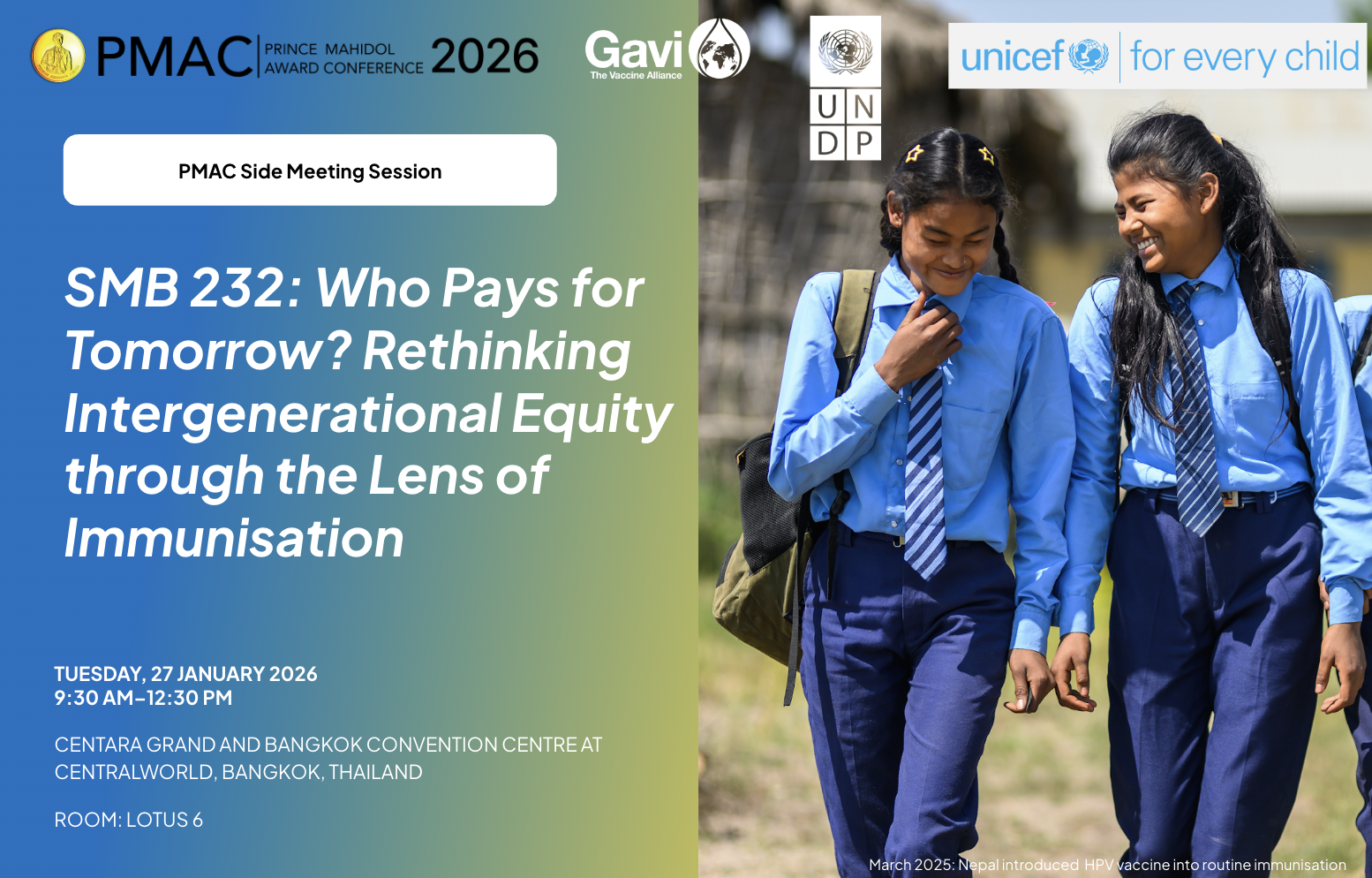Side Meetings
SMB232
Who Pays for Tomorrow? Rethinking Intergenerational Equity through the Lens of Immunisation
27
Jan
- Gavi, the Vaccine Alliance
- United Nations Development Programme (UNDP)
- United Nations Children’s Fund (UNICEF)

Introduction
Demographic change is reshaping health needs and public budgets, with younger populations requiring expanded services and ageing populations increasing fiscal pressure. At the same time, countries face declining external assistance and rising domestic demands, making it critical to protect long‑term investments like immunisation. Digital transformation is helping systems become more efficient and transparent, and Gavi’s Leap initiative supports these advancements through more agile, integrated and accountable approaches. These shifts raise important questions about fairness, responsibility and sustaining preventive services. This session explores practical, equitable strategies to secure resilient immunisation financing for future generations.
Agenda
- 09:30 – 09:35
- Welcome Remarks
- Moderator: Leslie Ong, Programme Manager, UNDP
- Welcome Remarks
- 09:35 – 10:30
- Panel 1 - Innovative Pathways to Sustainable and Equitable Health: Lessons from Immunisation: Panelists from government, health services, community and development partners will share experiences on how immunization programmes are evolving to navigate this transition, including the tension between optimizing budgets (efficiency) and reaching the underserved (equity) in the context of demographic shifts and shrinking resources. The discussion will focus on examining opportunities for introducing policy and programmatic approaches that better prioritize health within domestic resource allocation, and the policy trade-offs between efficiency and equity. The session will highlight approaches to strengthen country ownership, promote equitable access to vaccines, and leverage data and digital innovations that position immunization as a powerful lever for broader health system and fiscal governance reforms.
- Dr Khammany Phommachanh, Vice Chief of Immunization Division, National Center for Maternal and Child Health, MoH, Lao PDR
- Dr. Patricia Mechael, CEO, Health Enabled
- Ms. Noza Sary, Community Pharmacist, West Aceh Municipality, Indonesia
- Jennifer Asman, UNICEF East Asia and Pacific Regional Office
- Moderator: Leslie Ong, Programme Manager, UNDP
- Panel 1 - Innovative Pathways to Sustainable and Equitable Health: Lessons from Immunisation: Panelists from government, health services, community and development partners will share experiences on how immunization programmes are evolving to navigate this transition, including the tension between optimizing budgets (efficiency) and reaching the underserved (equity) in the context of demographic shifts and shrinking resources. The discussion will focus on examining opportunities for introducing policy and programmatic approaches that better prioritize health within domestic resource allocation, and the policy trade-offs between efficiency and equity. The session will highlight approaches to strengthen country ownership, promote equitable access to vaccines, and leverage data and digital innovations that position immunization as a powerful lever for broader health system and fiscal governance reforms.
- 10:30 - 10:40
- Panel 1 Audience Exchange
- 10:40 - 11:00
- Coffee Break
- 11:00 - 12:00
- Panel 2 - Tomorrow’s Health: Fairness and Fiscal Choices Across Generations: This panel will explore how countries can secure sustainable financing for immunisation and other preventive services amid competing priorities. Discussion will focus on practical approaches, such as domestic resource mobilisation, innovative financing tools, and budget safeguards, that protect prevention and promote equity across generations. Panelists will share insights on influencing fiscal policy, applying evidence in budget design, and leveraging partnerships to ensure long-term resilience.
- Dr. Khor Swee Kheng, CEO, Angsana Health
- Dr Walaiporn Patcharanarumol, Specialist of National Health Security Office, Seconded to the Secretariat of Prime Minister's Office Thailand
- Dr Hajime Inoue, Advisor to Ministry of Health, Labor and Welfare, Japan
- Amandeep Singh, Senior Social Sector Specialist, ADB
- Moderator: Chioma S. Nwachukwu, Head,Regional Advocacy, Gavi
- Panel 2 - Tomorrow’s Health: Fairness and Fiscal Choices Across Generations: This panel will explore how countries can secure sustainable financing for immunisation and other preventive services amid competing priorities. Discussion will focus on practical approaches, such as domestic resource mobilisation, innovative financing tools, and budget safeguards, that protect prevention and promote equity across generations. Panelists will share insights on influencing fiscal policy, applying evidence in budget design, and leveraging partnerships to ensure long-term resilience.
- 12:00 – 12:15
- Panel 2 Audience Exchange
- 12:15 – 12:30
- Closing Reflections and Wrap up
- Reframe immunisation financing within demographic, digital and fiscal transitions, highlighting intergenerational equity and data driven approaches for sustainability.
- Identify policy, financing and digital instruments, from domestic resource mobilisation to innovative and technology-enabled funding models, that can future-proof public health investments and improve accountability.
- Highlight the role of global health architecture reform, including Gavi Leap and cost-saving interventions and innovations, in supporting countries across the spectrum to the last mile, ensuring inclusive, resilient, and long-term efficiencies for governments.

